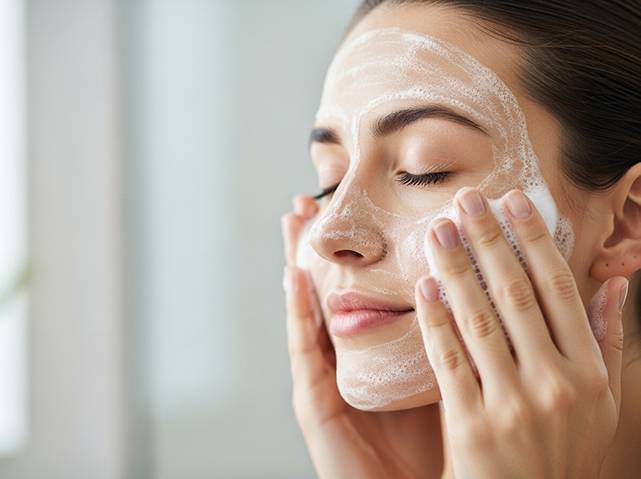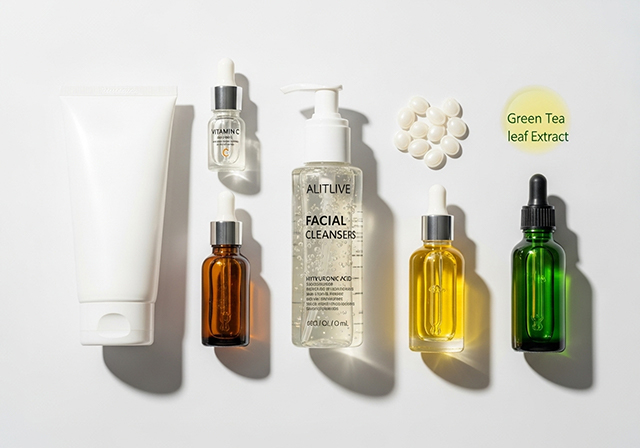The Importance of Face Wash in Anti-Aging
Face wash is not just a simple cleansing step but also a fundamental cornerstone in any anti-aging skincare routine. Clean skin is a prerequisite for effective absorption of nutrients while eliminating harmful environmental factors. Understanding the role of face wash will help you optimize its anti-aging benefits, preserving your skin’s youthful appearance.
What is Skin Aging, and Why is Face Wash Important?
Skin aging is a natural process everyone experiences, manifesting through signs like wrinkles, brown spots, sagging skin, and loss of elasticity. This process is accelerated by intrinsic factors (genetics, hormones) and extrinsic factors (UV rays, environmental pollution, stress, lifestyle habits). Daily, our skin faces dirt, sebum, makeup, and free radicals from polluted environments. If not properly cleansed, these impurities accumulate, clog pores, cause inflammation, and accelerate oxidation, damaging collagen and elastin—two essential proteins for firm, elastic skin. Face wash is the “hero” that removes these harmful agents, creating an ideal environment for skin recovery and regeneration.

Face wash not only cleanses but also serves as a crucial starting step for anti-aging skincare, removing impurities and preparing the skin for subsequent nourishing steps.
How Face Wash Helps Prevent Aging
Face wash works through multiple mechanisms to support anti-aging efforts. First and foremost, it thoroughly removes dirt, excess oil, dead skin cells, and makeup residue. Clean skin means unclogged pores, reducing the risk of acne and inflammation—factors that can damage skin and hasten aging. Second, clean skin allows anti-aging skincare products like serums and moisturizers to penetrate deeper and maximize their effectiveness. If impurities remain, valuable nutrients are blocked from reaching and nourishing deeper skin cells. Finally, some face washes contain active ingredients like antioxidants or mild acids, which protect against free radicals or gently exfoliate, promoting healthier, rejuvenated skin.
Choosing the Right Anti-Aging Face Wash for Your Skin
Choosing an anti-aging face wash isn’t a one-size-fits-all decision. Each skin type has unique needs, and finding the right product will determine the effectiveness of your entire skincare routine. Understanding your skin type and the product’s ingredients is crucial for making informed choices, ensuring the face wash not only cleanses but also nourishes and protects against aging signs.

Selecting a face wash suited to your skin type and containing key anti-aging ingredients is the key to optimizing daily skincare results.
Key Ingredients to Look For
To maximize the anti-aging potential of a face wash, prioritize products containing these ingredients:
- Antioxidants: Such as Vitamin C, Vitamin E, green tea extract, or Resveratrol. These neutralize free radicals, protect skin cells from environmental damage, and slow aging. Learn more about the role of antioxidants in skincare.
- Hyaluronic Acid (HA): A natural humectant, HA can hold 1,000 times its weight in water, keeping skin plump, smooth, and reducing the appearance of wrinkles caused by dehydration.
- Peptides: These small amino acid chains are building blocks for proteins like collagen and elastin. Peptides in face wash can stimulate collagen production, improving skin elasticity and firmness.
- Ceramides: These natural lipids form the skin’s protective barrier. Ceramides strengthen this barrier, prevent moisture loss, and shield skin from environmental damage, which is especially crucial for aging skin.
- AHA/BHA (Alpha Hydroxy Acids/Beta Hydroxy Acids): At low concentrations, these acids gently exfoliate, promote cell turnover, brighten skin, and improve texture. However, use sparingly to avoid irritation.
Face Wash for Different Skin Types
Selecting a face wash tailored to your skin type is critical to avoid irritation or disrupting the skin’s natural balance:
- Dry/Aging Skin: Opt for creamy or oil-based cleansers with minimal foam, rich in hydrating ingredients like HA, ceramides, or glycerin. Avoid products with soap or alcohol, which can further dry out the skin.
- Oily/Combination Skin: Choose gel-based or lightly foaming cleansers with BHA (Salicylic Acid) to control excess oil and deeply cleanse pores without over-drying.
- Sensitive Skin: Select fragrance-free, soap-free, alcohol-free cleansers with gentle, dermatologist-tested formulas. Products with soothing natural extracts like green tea or chamomile are also great choices.
- Normal Skin: You have more flexibility but should still opt for gentle cleansers that don’t strip moisture and contain antioxidants to maintain youthful skin.
The Proper Cleansing Routine to Maximize Anti-Aging Benefits
A proper cleansing routine is more than just washing your face—it’s an art that maximizes the benefits of an anti-aging face wash and prepares your skin for subsequent steps. At Good Health Plan, we believe consistency and proper technique are key to achieving your dream skin. Let’s explore the steps for an effective cleansing routine to keep your skin nourished and protected.
Double Cleansing: An Essential Starting Step
Double cleansing is vital, especially in the evening, to thoroughly remove makeup, sunscreen, dirt, and excess oil accumulated throughout the day. Start with an oil-based cleanser (cleansing oil or balm) to dissolve stubborn makeup and oil-based impurities. Gently massage onto dry skin for 1–2 minutes, then emulsify with a little water to turn it into a milky texture before rinsing off. This step deeply cleanses without causing friction or drying out the skin, perfectly preparing it for the next cleansing step.
Cleansing with an Anti-Aging Face Wash
After double cleansing, it’s time for your anti-aging face wash to shine. Dispense a small amount into your hands, create a light foam (if it’s a gel or foaming cleanser) or apply directly (if it’s a cream). Spread evenly over your damp face and neck, massaging gently in circular motions from the center outward and bottom to top for 30–60 seconds. This not only cleanses but also stimulates blood flow, enhancing nutrient absorption. Rinse with lukewarm water (not too hot or cold) to ensure no residue remains. Pat your skin dry with a clean, soft towel—avoid rubbing harshly.
Post-Cleansing Skincare Steps
After cleansing, your skin is primed to absorb nutrients. Don’t skip these crucial steps:
- Toner: Use an alcohol-free toner to balance skin pH, provide initial hydration, and remove any lingering impurities. Toner also preps the skin for subsequent products.
- Anti-Aging Serum: This is the ideal time for serums like Vitamin C, Hyaluronic Acid, or Peptide to work their magic. Apply serum to slightly damp skin for better absorption.
- Moisturizer: Lock in hydration with a moisturizer suited to your skin type. It not only hydrates but also forms a protective barrier to maintain the skin’s natural moisture.
Following these steps ensures your anti-aging face wash becomes an integral part of your journey to youthful skin.
Mistakes to Avoid When Using Anti-Aging Face Wash
Even with the best anti-aging face wash, mistakes in usage can reduce effectiveness or even harm your skin. Avoiding these common errors will help you maximize the product’s benefits and protect your skin from premature aging.
Using Harsh Products or Cleansing Too Often
One of the biggest mistakes is believing that harsher or more frequent cleansing leads to cleaner, more youthful skin. In reality, using overly strong cleansers or washing more than twice daily (unless specifically needed) can strip the skin’s natural oils, damage the lipid barrier, and cause dryness, irritation, or even excess oil production as the skin compensates. This makes skin more vulnerable and accelerates aging. Always choose gentle products and listen to your skin’s response.
Ignoring Ingredient Labels
Many people choose face washes based on ads or recommendations without checking ingredient labels. This can lead to using products with irritating ingredients like drying alcohol, synthetic fragrances, parabens, or sulfates (SLS/SLES)—especially problematic for sensitive skin. These can harm the skin over time and diminish the anti-aging benefits of other ingredients. Prioritize products with clear, gentle ingredient lists suited to your skin type.
Neglecting a Comprehensive Skincare Routine
An anti-aging face wash is crucial but not a standalone solution. Focusing solely on cleansing while neglecting other steps like moisturizing, using targeted serums, or applying sunscreen significantly reduces anti-aging effectiveness. Aging is a complex process requiring holistic care from within and without. At Good Health Plan, we emphasize that a healthy lifestyle, balanced diet, and complete skincare routine are key to maintaining youthful skin long-term.
Additional Tips for Maintaining Youthful Skin
Beyond using an anti-aging face wash correctly, other factors play a vital role in keeping your skin youthful. Incorporating these tips into your daily routine will optimize results, delivering radiant, long-lasting beauty to your skin.
Healthy Diet and Lifestyle
Your skin reflects your overall health. A diet rich in antioxidants from dark leafy greens, berries, nuts, and fatty fish (omega-3s) provides essential nutrients to combat free radicals from within. Drinking enough water daily maintains skin hydration and elasticity. Getting 7–9 hours of sleep nightly allows your skin to recover and regenerate. Managing stress, exercising regularly, and avoiding harmful habits like smoking or excessive alcohol consumption are also critical for slowing skin aging.
The Importance of Sunscreen
Sun exposure is a leading cause of premature aging. UV rays can destroy collagen and elastin, causing wrinkles, brown spots, and loss of elasticity. No matter how effective your face wash is, skipping sunscreen renders your efforts futile. Learn more about the harmful effects of UV rays on your skin to understand the importance of daily protection. Use a broad-spectrum sunscreen with SPF 30 or higher every day, even on cloudy days or indoors near windows. Reapply every 2–3 hours if you’re outdoors or sweating.
Consulting Experts
If you have specific skin concerns or want a personalized anti-aging routine, don’t hesitate to consult a dermatologist or skincare professional. They can assess your skin type, evaluate aging signs, and recommend the best products or treatments. Sometimes, advanced treatments like laser, chemical peels, or injectables like Botox/fillers may be considered for optimal results. At Good Health Plan, we encourage seeking professional advice to ensure safety and efficacy for your skin.
FAQs
Can an anti-aging face wash replace serum or moisturizer?
No. An anti-aging face wash cleanses and preps the skin, but its contact time is too short for active ingredients to penetrate deeply and deliver full anti-aging benefits. Serums and moisturizers are designed to provide intensive nourishment and better protect the skin.
How many times a day should I wash my face for anti-aging?
Typically, twice a day (morning and evening) is sufficient. Overwashing can strip the skin’s natural oils, leading to dryness and a weakened skin barrier, which may accelerate aging.
Is it necessary to remove makeup before using an anti-aging face wash?
Yes, especially in the evening. Makeup removal eliminates makeup, sunscreen, and oil-based dirt that a regular face wash might not fully cleanse. This allows the anti-aging face wash to work more effectively and enhances the absorption of subsequent anti-aging products.
Is an anti-aging face wash suitable for all skin types?
No. You should choose an anti-aging face wash with a formula and ingredients tailored to your specific skin type (dry, oily, combination, sensitive) to avoid irritation and achieve optimal results.

Johnny Jacks was born in 1985 in Texas, USA. He is the founder of Good Health Plan and is passionate about helping people improve their health and physical well-being. With over a decade of experience working in the healthcare industry, he currently works at Goodheathplan.com – a blog that shares knowledge on beauty and health.
